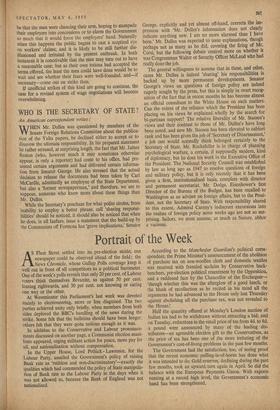WHO IS THE SECRETARY OF STATE ?
An American correspondent writes : While the Secretary's penchant for what polite circles, from inability to employ a better phrase, call 'sharing responsi- bilities' should be noticed, it should also be noticed that when he does, in all fanfare, issue a statement that the build-up by the Communists off Formosa has 'grave implications,' Senator George, explicitly and yet almost off-hand, corrects the im- pression with `Mr. Dulles's information does not clearly indicate anything new. I am no more alarmed than I have been.' Mr. Dulles was expected to issue explanations, though perhaps not as many as he did, covering the firing of Mr. Corsi, but the following debate centred more on whether it was Congressman Walter or Security Officer McLeod who had really done the job.
The general willingness to assume that in these, and other, cases Mr. Dulles is indeed 'sharing' his responsibilities is backed up by more permanent developments. Senator George's views on questions of foreign policy are indeed eagerly sought by the press, but this is simply in overt recog- nition of the fact that in recent months he has become almost an official consultant to the White House on such matters. Can the extent of the reliance which the President has been placing on his views be explained wholly by the search for bi-partisan support? The relative liberality of Mr. Stassen's views and their contrast to those of Mr. Dulles's have long been noted, and now Mr. Stassen has been elevated to cabinet rank and has been given the job of 'Secretary of Disarmament,' a job one would normally think belonged certainly to the Secretary of State. Mr. Rockefeller is in charge of planning psychological warfare, a certain, if supposedly modern, kind of diplomacy, but he does his work in the Executive Office of the President. The National Security Council was established by law as long ago as 1947 to resolve questions of foreign and military policy, but it is only recently that it has been given a firm, institutionalised basis, complete with director and permanent secretariat. Mr. Dodge, Eisenhower's first Director of the Bureau of the Budget, has been recalled to Washington as an adviser on foreign affairs, but to the Presi- dent, not the Secretary of State. With responsibility shared to this extent, Admiral Carney's indiscreet excursions into the realms of foreign policy some weeks ago are not so sur- prising. Sailors, we must assume, as much as Nature, abhor a vacuum.










































 Previous page
Previous page